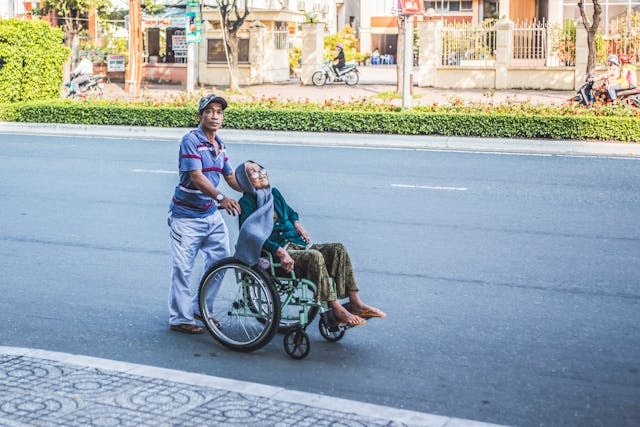Looking for a comprehensive Geriatric Care Services Guide? Read our Article! 1

The National Disability Insurance Scheme (NDIS) provides essential support to people with disabilities, and its role in geriatric care service is crucial for ensuring the well-being of older Australians. For families, carers, and elderly individuals navigating the NDIS, understanding how to maximise these benefits can make a significant difference in the quality of care and support provided.
This practical guide aims to help older adults and their families explore the full spectrum of GCS available through NDIS, including health services referral, emotional support, and daily living assistance.
At Re.Connect Support Service, as an NDIS Registered Support Provider in Australia, we are committed to delivering the highest level of care and expertise to help older individuals maintain their independence, health, and quality of life.
1. What is Geriatric Care Service under NDIS?
Geriatric care management services focus on the health and well-being of older people, addressing both their physical and mental health needs. These services can include personal care, medical appointments, and assistance with daily living.
With the NDIS, eligible older adults can access a multidisciplinary approach to health management that includes allied health personnel, geriatric care managers, and specialised treatments tailored to the unique needs of elderly individuals.
2. The Role of Comprehensive Geriatric Assessment (CGA)
A comprehensive geriatric assessment (CGA) is an in-depth evaluation of an older person’s medical, psychological, and functional abilities. This type of comprehensive geriatric assessment allows geriatric care managers and allied health individuals to develop a personalised care plan tailored to the individual’s needs. It ensures that the person receives the necessary support for their medical conditions, reduced mobility, and emotional well-being. CGAs are vital for creating a holistic approach to care that enhances quality of life and prevents unnecessary hospital admissions.
3. NDIS Geriatric Care Service: What’s Included?

NDIS-funded community GCS offer a wide range of assistance to older patients, including:
Personal Care Included in Geriatric Care Services
Assistance with daily tasks such as bathing, dressing, and grooming.
Meal Delivery Services
Ensuring older people have access to nutritious meals.
Allied Health Professionals
Regular visits from physiotherapists, occupational therapists, and other health team members to maintain physical function and mobility.
Emotional Support
Addressing mental health needs and providing companionship.
Medical Appointments
Coordination of healthcare services, including transportation to clinics or hospitals.
Home Care Services
In-home care options that provide support on a regular basis.
By combining these services with the assistance and advice of a geriatric care manager, older people and their families can ensure they are receiving all the support needed to maintain their independence and quality of life.
4. Understanding the Multidisciplinary Approach in Aged Care
One of the key features of GCS through the NDIS is the multidisciplinary approach. This involves a team of healthcare professionals working together to provide comprehensive support.
From doctors specialising in geriatric medicine to allied health individuals, this collaboration ensures that every aspect and function of an elderly person’s health is taken into consideration.
For example, older patients may require assistance not only for their physical health but also for managing chronic conditions like dementia.
In this scenario, geriatric care managers can coordinate patient together with specialists, such as neurologists and social workers, to develop a holistic care plan that covers all facets of their care.
5. Improving Quality of Life Through Personalised Care Plans

Every older person has unique needs, and creating a personalised care plan is essential to maximising NDIS benefits. A comprehensive geriatric care services plan not only covers medical treatments but also addresses personal care, emotional support, and assistance with daily living tasks.
For those with reduced mobility or chronic conditions, a customised plan can significantly improve their ability to live independently and reduce the risk of falls or hospitalisation.
6. Geriatric Care Services and Residential Aged Care Facilities
While many older adults prefer to remain at home, others may require the support of a full residential aged care facility. The NDIS can cover aspects of residential care, including medical treatments and therapy services.
Aged care facilities offer a safe environment for older patients who need continuous care and monitoring. The combination of NDIS funding and GCS ensures that residents receive high-quality, consistent care in a residential aged care setting.
7. Mental Health Support in Geriatric Care

Addressing mental health is a critical part of geriatric care. Older adults often face mental health challenges, including anxiety, depression, and isolation.
NDIS funding can help provide access to counselling, therapy, and emotional support. Allied health personnel, such as psychologists and social workers, can play an important role in managing the emotional and psychological well-being of older people.
8. Supporting Families and Carers
Families and carers often play a significant role in providing care to older adults. Through the NDIS, families can access respite care services, counselling, and educational resources to help them manage the demands of caregiving.
This support allows family and carers to take a break and focus on their own wellbeing, while ensuring that their loved one continues to receive high-quality care.
9. Practical Assistance with Daily Living

NDIS GCS provide a range of practical support for daily living. This can include:
- Paying bills and managing finances.
- Meal preparation and delivery.
- Assistance with medical appointments and rehabilitation.
- Personal care and help with household chores.
These services are designed to enhance independence and allow older adults to stay in their homes for as long as possible.
10. The Importance of Preventative Care and Regular Assessments
Regular comprehensive geriatric evaluations are essential for identifying health risks and preventing the progression of chronic illnesses. NDIS participants can benefit from regular assessments by their healthcare team, including geriatric care managers. These assessments ensure that older age and patients receive timely interventions and referrals to specialists when necessary.
11. Accessing NDIS GCS: A Step-by-Step Guide

To access NDIS benefits for GCS, individuals must first undergo an eligibility assessment. Once approved, a geriatric care manager will work closely with the older person and their other family member to develop a tailored care plan. The next step involves selecting the services needed, such as home care, allied health treatments, or support for residential aged care.
12. Maximising NDIS Benefits for Older Adults
Finally, to get the most out of NDIS GCS, it’s essential to work closely with your healthcare team and regularly review the care plan. As health needs change, updating the plan ensures that the individual continues to receive the appropriate level of care. Whether it’s providing access to emergency department services or ensuring timely treatment and rehabilitation post-surgery, a flexible, patient-centred approach is key to maximising NDIS benefits.
Conclusion

Maximising NDIS benefits for GCS requires a well-coordinated approach involving comprehensive assessments, personalised care plans, and regular monitoring by healthcare professionals. With the support of the NDIS, older Australians can access a wide range of services, from personal care and nursing to mental health support, ensuring they live fulfilling and independent lives.
Re.Connect Support Service is here to help older adults and their families navigate the NDIS, providing expert guidance and support every step of the way. Contact us today to learn more about our geriatric care services and how we can assist with your geriatric care needs.
FAQs
- What is a comprehensive geriatric assessment (CGA)? A CGA is a detailed evaluation of an older person’s medical, psychological, and functional capabilities to create a personalised care plan.
- How does the NDIS support mental health in geriatric care services? NDIS funds psychological therapy, emotional support, and counselling services to address the mental health needs of older adults.
- What is the role of a geriatric careservices manager? A geriatric care manager coordinates care for older adults, ensuring they receive appropriate medical, personal, and emotional support.
- How can families access geriatric care services through NDIS? Families can access respite care by discussing their needs with their geriatric care manager, who can arrange temporary support services.
- What services can be included in a personalised NDIS care plan? A personalised care plan can include personal care, meal delivery, medical appointments, and allied health services tailored to the individual’s needs.


